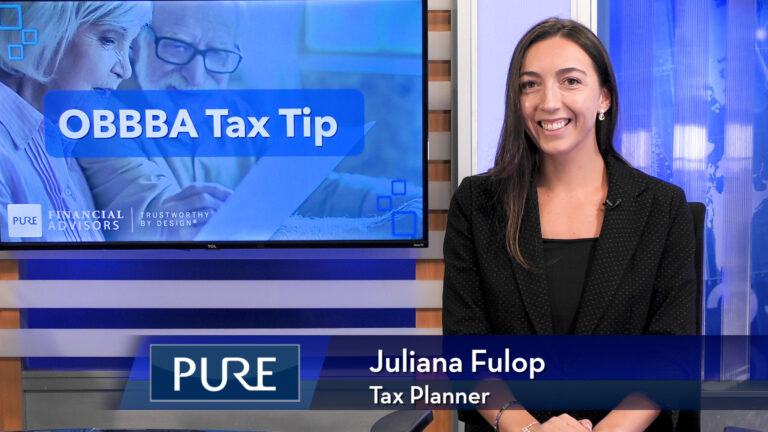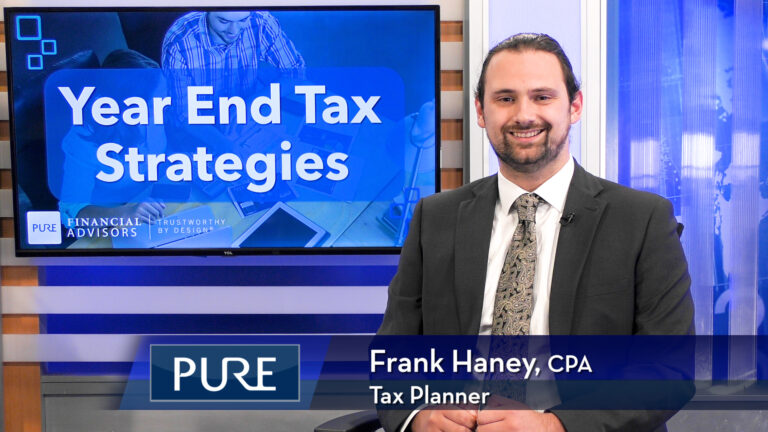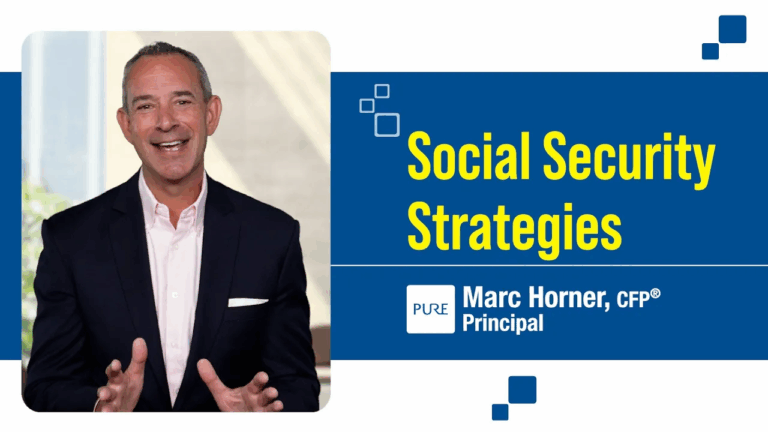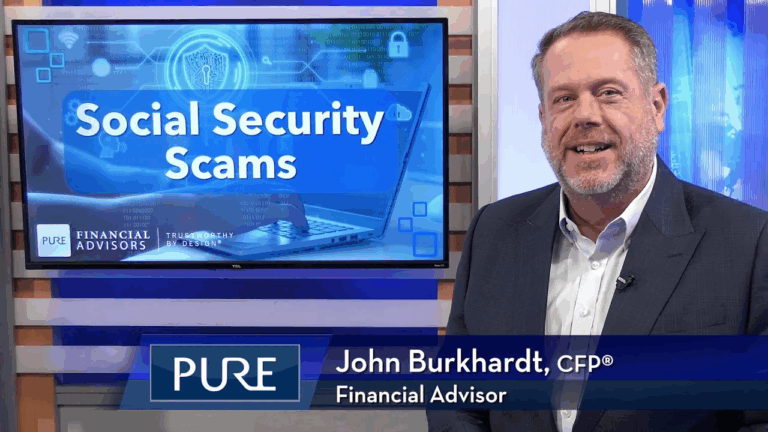Spotting a scam as soon as you receive it is crucial to protecting yourself from financial harm. Pure’s Senior Financial Advisor, Bill Hodapp, CFP®, AIF® highlights some of the most common 2024 scams that put people at risk. By recognizing these warning signs, you can safeguard your financial well-being and prevent potential losses.
Transcript
Scams are continuing to evolve but the underlying approach remains the same – to get you to act quickly without thinking through the situation so the scammer can get your personal and financial information. The goal of course is to steal your money!
The Federal Trade Commission reports that consumers lost more than $10 billion to fraud last year which is a 14% increase over the prior year
Have you or someone you know become the victim of a scam? Being aware of the Top 2024 Scams is your first line of defense, so let’s jump in.
Phone Scams
This is where impersonators pose as representatives from your bank, IRS, etc. They try to convince you that your account is at risk. They’ll ask for your bank information – account number, PIN, etc.
Robocalls
These are automated calls that use a recording. They often try to sell you something or convince you that something is wrong. Popular robocall scams include auto warranty scams, where they convince you that you must extend your auto warranty or buy a warranty from a company that’s not legitimate.
IRS scams
Someone pretending to be from the IRS will say that you have a refund coming or an amount due and that they need your bank information to process the transaction. Remember that the IRS initiates most outreach through mail.
Text Scams
Similar to phone scams but can be even more dangerous. Texts from senders posing to be your bank, or the IRS or another organization. They usually ask you to call a number or click on a link which installs malware on your device.
Online Shopping Scams
Here scammers setup websites that look like legitimate online stores only to steal your personal information or sell you stolen goods.
Zelle Scams
These are calls, texts or emails from someone pretending they work for your bank’s fraud department saying someone was trying to steal money through Zelle and that they will help you fix it. From there, they’ll tell you to send money to yourself, but it goes to them instead.
Student Loan Forgiveness Scams
These are scams where the scammers feed off knowing that people want to believe their student loans will be forgiven. They direct you to a fake application website to steal your Social Security or bank account information.
Grandparent Scams
The scammer poses as your grandchild and pretends to be in an urgent situation, like in jail or behind on an important bill, they then ask for financial assistance.
AI Generated Scams
Something newer here. Scammers will impersonate a family member or friend and ask for money or even a celebrity to trick you into thinking you’re investing in a legitimate company. They do this by manipulating videos and recordings on social media to produce realistic looking videos or voice recordings.
Medicare Scams
Someone claims to be a Medicare representative will reach out to you and ask for personal and medical information. They might say that you need a new Medicare card or offer additional coverage at a discount. Then of course they use or sell your personal financial information.
Charity Scams
Here scammers convince people to send money to a fake charity. They pressure you to act quickly and sometimes tie it to a current event to make it more believable.
Romance Scams
These usually start online. Someone builds a romantic relationship with you getting to know you over weeks or months. Then they ask for money – to help them out of a difficult situation on invest in a business opportunity.
Employment Scams
People including seniors looking for a new job or to make money working from home. They say that all you need to do is pay for training fee – once they have your personal information, they will use it for illegal purposes.
Money Mule Scams
Scammers try to recruit money mules through job ads. They’ll ask you to deposit funds into your bank account and transfer money to someone else. It may seem legitimate since you’re being paid for work but the extra funds that you’re transferring may be to launder criminals’ funds.
What Can You Do if You Become a Victim?
Report what happened to the FTC at https://reportfraud.ftc.gov/, file a police report and report it to other parties involved – bank, credit card company, phone company, email provider, etc.
Scan your devices using antivirus software and anti-malware software, if necessary.
Change your passwords, use stronger passwords and be sure to use a password manager to help you remember your new passwords.
Do a fraud alert and consider freezing your credit which can be done by contacting the three credit bureaus.
If you need help with these or other financial topics, please contact Pure for a free financial assessment.
Subscribe to our YouTube channel.
IMPORTANT DISCLOSURES:
• Investment Advisory and Financial Planning Services are offered through Pure Financial Advisors, LLC, a Registered Investment Advisor.
• Pure Financial Advisors LLC does not offer tax or legal advice. Consult with your tax advisor or attorney regarding specific situations.
• Opinions expressed are subject to change without notice and are not intended as investment advice or to predict future performance.
• Investing involves risk including the potential loss of principal. No investment strategy can guarantee a profit or protect against loss in periods of declining values.
• All information is believed to be from reliable sources; however, we make no representation as to its completeness or accuracy.
• Intended for educational purposes only and are not intended as individualized advice or a guarantee that you will achieve a desired result. Before implementing any strategies discussed you should consult your tax and financial advisors.
CFP® – The CERTIFIED FINANCIAL PLANNER™ certification is by the Certified Financial Planner Board of Standards, Inc. To attain the right to use the CFP® designation, an individual must satisfactorily fulfill education, experience and ethics requirements as well as pass a comprehensive exam. Thirty hours of continuing education is required every two years to maintain the designation.
AIF® – Accredited Investment Fiduciary designation is administered by the Center for Fiduciary Studies fi360. To receive the AIF Designation, an individual must meet prerequisite criteria, complete a training program, and pass a comprehensive examination. Six hours of continuing education is required annually to maintain the designation.













